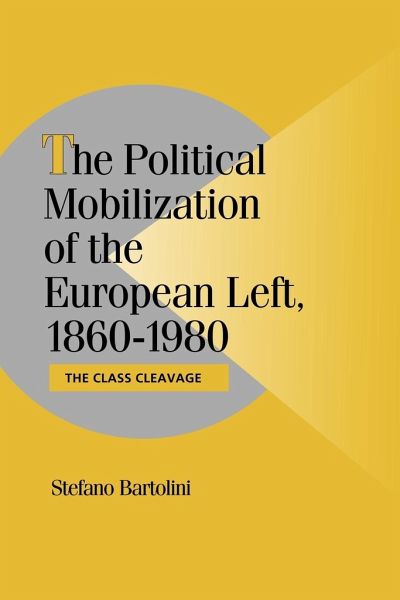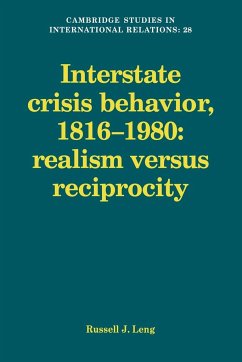
The Political Mobilization of the European Left, 1860 1980
The Class Cleavage
Herausgeber: Lange, Peter; Bates, Robert H.
Versandkostenfrei!
Versandfertig in 1-2 Wochen
63,99 €
inkl. MwSt.

PAYBACK Punkte
32 °P sammeln!
In an in-depth comparative analysis, Stefano Bartolini studies the history of socialism and working-class politics in Western Europe.In an in-depth comparative analysis, Stefano Bartolini studies the history of socialism and working-class politics in Western Europe. While examining the social contexts, organizational structures and political developments of thirteen socialist experiences from the 1880s to the 1980s, he reconstructs the steps through which social conflict was translated and structured into an opposition, as well as how it developed its different organizational and ideological f...
In an in-depth comparative analysis, Stefano Bartolini studies the history of socialism and working-class politics in Western Europe.
In an in-depth comparative analysis, Stefano Bartolini studies the history of socialism and working-class politics in Western Europe. While examining the social contexts, organizational structures and political developments of thirteen socialist experiences from the 1880s to the 1980s, he reconstructs the steps through which social conflict was translated and structured into an opposition, as well as how it developed its different organizational and ideological forms, and how it managed more or less successfully to mobilize its reference groups politically. Bartolini provides a comparative framework that structures the wealth of material available on the history of each unit and allows him to assess the relative weight of the complex explanatory factors.
Review quote:
'Stefano Bartolini has written a large, intimidating monster of a book, but there is beauty in this beast. This work of substantial scholarship encompasses over a century of politics in about 600 pages of closely argued text (?)0; this is a book that should be essential rewarding for any scholar interested in European politics, including graduate students. It is an essential resource for anyone interested in the left, party politics or the history of the European nation-state; but it is much more than a resource book as it develops a powerful and compelling argument.' Regional and Federal Studies
Table of contents:
List of figures and tables; Acknowledgments; Introduction; 1. The class cleavage: conceptual and methodological framework; 2. The European Left: size, ideological orientation and organizational cohesion; 3. Industrialization, urbanization and Labor's response; 4. Cultural heterogeneity; 5. Enfranchisement; 6. Organizational structuring and membership mobilization; 7. Political integration; 8. Cleavage structures; 9. The communist split: united and divided Lefts; 10. The macroconstellation of class cleavage structuring; Data appendix; References; Index.
In an in-depth comparative analysis, Stefano Bartolini studies the history of socialism and working-class politics in Western Europe. While examining the social contexts, organizational structures and political developments of thirteen socialist experiences from the 1880s to the 1980s, he reconstructs the steps through which social conflict was translated and structured into an opposition, as well as how it developed its different organizational and ideological forms, and how it managed more or less successfully to mobilize its reference groups politically. Bartolini provides a comparative framework that structures the wealth of material available on the history of each unit and allows him to assess the relative weight of the complex explanatory factors.
Review quote:
'Stefano Bartolini has written a large, intimidating monster of a book, but there is beauty in this beast. This work of substantial scholarship encompasses over a century of politics in about 600 pages of closely argued text (?)0; this is a book that should be essential rewarding for any scholar interested in European politics, including graduate students. It is an essential resource for anyone interested in the left, party politics or the history of the European nation-state; but it is much more than a resource book as it develops a powerful and compelling argument.' Regional and Federal Studies
Table of contents:
List of figures and tables; Acknowledgments; Introduction; 1. The class cleavage: conceptual and methodological framework; 2. The European Left: size, ideological orientation and organizational cohesion; 3. Industrialization, urbanization and Labor's response; 4. Cultural heterogeneity; 5. Enfranchisement; 6. Organizational structuring and membership mobilization; 7. Political integration; 8. Cleavage structures; 9. The communist split: united and divided Lefts; 10. The macroconstellation of class cleavage structuring; Data appendix; References; Index.














